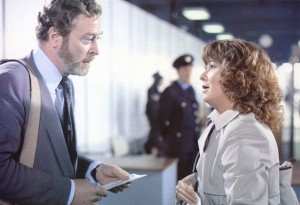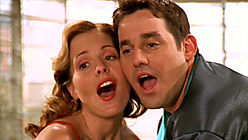My relationship with happy endings has been on-again, off-again, as Buffy the Vampire Slayer, season 6, episode 16, has reminded me.
I’m just getting to the series now. For a decade I’ve been going to genre conventions and passing right by the slayer swag—though I have sought some out, many Christmases and Junes, as gifts for my sister. She gave me the first season on DVD years ago. “It’s pretty terrible,” she said, “but you have to watch it, because OH MY GOD, it gets better.” But I never did—not until this past year. And OH MY GOD, she was right.
The episode in question: “Hell’s Bells”, in which Anya and Xander are all set to get married. Only they don’t—not because she’s a former vengeance demon and he’s a mortal construction worker; not even because another demon intervenes and tries to stop the proceedings (though this is certainly the catalyst). No, Anya and Xander get all dressed up and not-married because Xander has doubts. Because he’s uncertain, even though he loves her, and even though he was the one who wanted this, that he’s ready for it.
The left-at-the-altar cliché—and yet I found this particular iteration of it affecting. Part of me was surprised, because I’m usually cynical about clichés, and because I usually prefer my stories more ambiguous than obvious, and because this is Buffy the Vampire Slayer, for crapssake.
But notice I said “part of me was surprised.” Another part wasn’t. I haven’t always gone for nuance.
My mother took me to see the movie Educating Rita when I was 13. I loved it: Julie Walters as a diamond-in-the-rough student; Michael Caine as a washed-up alcoholic professor; the poetry and sparks that flew between them. I loved it right up until the very end, when he said goodbye to her and got on a plane and flew to Australia. And that was it! That was all! There was no final, years-later, golden-hued sequence in which they ran into each other at, say, the Eiffel Tower and kissed! I felt both heartbroken and betrayed.
As it happened, I was writing my very first novel at the very same time. In it, three siblings from 1983 Toronto stumble upon and through a portal into another world. Wondrous, fantastical things transpire. The eldest of the siblings, a (surprise!) 14-year-old girl, ends up aiding in the destruction of the malevolent Silent Watcher and falling in love with a black-haired, grey-eyed, magic-wielding, dragon-owning local guy. She stays with him in the Land of the Rising Sun (yes. I know), and lives happily ever after. I remember having niggling thoughts, as I wrote, then typed, then re-read my manuscript. Thoughts like, “What about her family back in Toronto?” and “Maybe this is all just a little too happy?” But she was me, and I was 13. I needed my story to end with Good vanquishing Evil and True Love vanquishing All; I needed every story, ever, to end this way.
Cue the growing up thing.
One indication of having accomplished some measure of said growing up: When I was in university, in my tiny apartment on Rue Université, I watched Educating Rita again, and I got all teary because it was so sad and hopeful and right.
None of my published books has a resoundingly happy ending. The first is pretty ambiguous; the second deals joy to some characters and death or devastation to others; the third is the darkest of them all. What relieves me about reader reactions to these endings, especially to The Pattern Scars’, is that they’ve been unanimous: the darkness is meaningful, credible and true, rather than gratuitous. (Because yes, unhappy endings can be just as gratuitous as happy ones.)
I never know how my books are going to end, when I start them, and I never rub my hands together and think, “Oooooh—can’t wait to see how distressing I can make things this time…” But I’ve been consistent on the dark-and-believable front, so far, and I imagine I’ll continue to be.
Back to Buffy. I like these characters: their snappy Whedonspeak, their idiosyncrasies, the ass-kickings they endure and deliver. After six seasons’ worth of DVDs, you could say that I even care about them. I want them to be happy, and I want them to be happy together. And if Anya and Xander do get married? I’ll get all teary because it’ll be so joyous and hopeful and right.
Anya and Xander. Walters and Caine. Even if one of them’s a demon, they’re functionally people, like me. I feel for them. I want the best for them, as I do for myself.
It’s not, as they say, rocket science. I can’t seem to write happily-ever-after endings, but I really, really want to live one.



Recent Comments